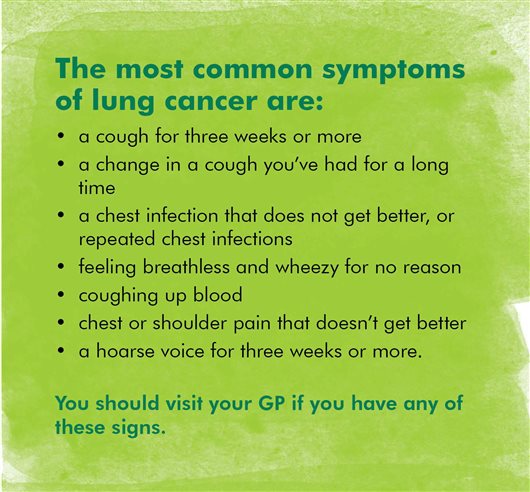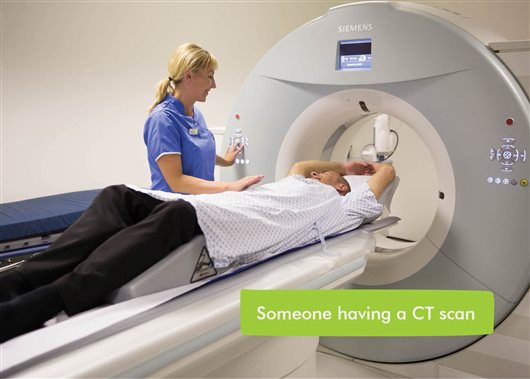This Lung Cancer Awareness Month, Editorial Assistant Liza shares information about lung cancer risk factors, symptoms, types of lung cancer and diagnosis.
Lung cancer is the third most common cancer diagnosed in the UK. About 46,400 people are diagnosed with it each year. The number of men diagnosed with lung cancer is decreasing. But the number of women diagnosed with it is increasing.
Most lung cancers are caused by smoking. Some people who have never smoked may develop lung cancer. But the best way to prevent lung cancer is never to smoke or to stop smoking if you do.
It’s also important to be aware of the symptoms of lung cancer and to see your GP straight away if you have any of these.
Main risk factors
Smoking
Smoking tobacco is the biggest risk factor. The more you smoke (this includes cigarettes, cigars and pipes), the greater your risk. Around 90% of people (9 out of 10) who get lung cancer are smokers or ex-smokers. Starting smoking at a young age means the risk is higher.
People who do not smoke can also develop lung cancer, but their risk is much lower. About 10% of people (around 1 in 10) who get lung cancer have never have smoked.
When people stop smoking, their risk of lung cancer gets lower over time. After 12 years of stopping smoking your risk of lung cancer is about 70% lower than people who do smoke. After about 15 years it’s almost the same as a non-smoker.
We have more information about giving up smoking available free in our booklet Giving up smoking. You can also order our free Easy Read booklet Stay healthy – stop smoking.
Passive smoking
Breathing in other people’s cigarette smoke (passive or second-hand smoking) can slightly increase the risk of lung cancer. The risk is much lower than if you smoke yourself. In the UK, smoking in most enclosed public places and workplaces is now banned.
Symptoms
It is important to know the symptoms of lung cancer. If you have any of these symptoms, you should have them checked by your GP.

Other possible symptoms include:
If you have any of these symptoms, you should have them checked by your GP. Some of these symptoms may also be caused by other conditions or by smoking.
Lung cancer is occasionally diagnosed by chance when a person is having tests for another condition.
Types of lung cancer
There are two main types of primary lung cancer. They behave in different ways and respond to treatment differently.
They are:
Diagnosing lung cancer
Tests
If your GP thinks you should have tests for lung cancer, you will usually have a chest x-ray to check your lungs for anything that looks abnormal.
Most people have a CT scan, too. Even if your chest x-ray does not show signs of lung cancer depending on your symptoms, you may have a CT scan.

Biopsy
You will usually have a biopsy to find out if you have lung cancer. This involves removing samples of cells or tissue from the abnormal area to examine for cancer cells. There are different ways of doing a biopsy. Your cancer doctor or nurse will talk to you about the type of biopsy you will have.
Treating lung cancer
Treatment for lung cancer can include surgery, chemotherapy, radiotherapy, targeted therapy and immunotherapy drugs. People may have a combination of treatments.
Treatment for non-small cell lung cancer and treatment for small cell cancer may be different. For example, surgery isn’t usually used to treat small cell lung cancer.
We hope you have found this blog helpful this Lung Cancer Awareness Month. For more information, our booklet Understanding lung cancer is free to order, and is also available as an audiobook. Our Signs and symptoms of lung cancer card is available as a pdf in other languages. You may also find joining or reading stories on the Online Community’s lung cancer forum helpful.
To see what else Macmillan's cancer information team has been blogging about, please visit our blog home page! You can subscribe to receive our blogs by email or RSS too.
We're with you every step of the way
The Macmillan team is here to help. Our cancer support specialists can answer your questions, offer support, or simply listen if you need a chat. Call us free on 0808 808 00 00.
Comments? Feel free to add them below (you need to be logged in).
Keep in touch Follow Macmillan’s cancer information team on Twitter @mac_cancerinfo
Whatever cancer throws your way, we’re right there with you.
We’re here to provide physical, financial and emotional support.
© Macmillan Cancer Support 2025 © Macmillan Cancer Support, registered charity in England and Wales (261017), Scotland (SC039907) and the Isle of Man (604). Also operating in Northern Ireland. A company limited by guarantee, registered in England and Wales company number 2400969. Isle of Man company number 4694F. Registered office: 3rd Floor, Bronze Building, The Forge, 105 Sumner Street, London, SE1 9HZ. VAT no: 668265007